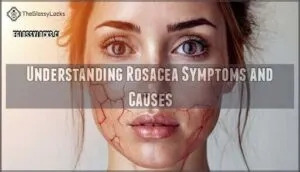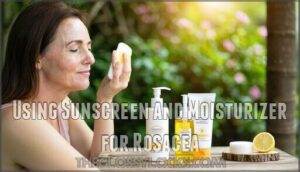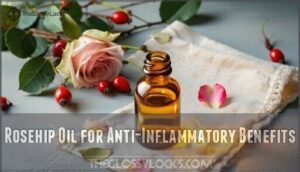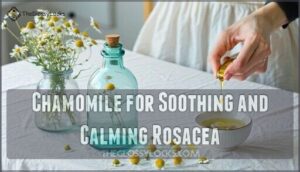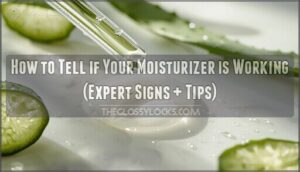This site is supported by our readers. We may earn a commission, at no cost to you, if you purchase through links.

You’ll want to prioritize products with anti-inflammatory ingredients like niacinamide, azelaic acid, and ceramides while avoiding common triggers such as alcohol, fragrances, and harsh exfoliants.
Your best bet is sticking to a simplified routine featuring gentle cleansers, targeted serums, broad-spectrum sunscreen, and barrier-repairing moisturizers.
The trick isn’t just finding products labeled "sensitive" – it’s understanding which specific formulations work with your skin’s compromised barrier rather than against it.
Table Of Contents
- Key Takeaways
- Managing Rosacea With Skincare
- Understanding Rosacea Symptoms and Causes
- Top 8 Best Skincare Products for Rosacea
- Creating a Rosacea-Friendly Skincare Routine
- Natural Ingredients for Rosacea Skincare
- Frequently Asked Questions (FAQs)
- What products are good for rosacea?
- What iS the number one trigger for rosacea?
- iS CeraVe rosacea friendly?
- How often should I moisturize my face if I have rosacea?
- What type of skincare is good for rosacea?
- How to treat rosacea sensitive skin?
- What not to put on rosacea skin?
- What is the best thing to wash your face with if you have rosacea?
- How often should I exfoliate sensitive skin with rosacea?
- Will rosacea skincare products help with acne and redness?
- Conclusion
Key Takeaways
- You’ll need to prioritize gentle formulations with anti-inflammatory ingredients like niacinamide, azelaic acid, and ceramides, while avoiding harsh triggers, such as alcohol and fragrances, that worsen rosacea symptoms.
- You should stick to a simplified routine featuring fragrance-free cleansers, targeted serums, broad-spectrum mineral sunscreen, and barrier-repairing moisturizers, rather than complex multi-step regimens.
- You can’t rely on "sensitive" labels alone – you need to understand which specific ingredients work with your compromised skin barrier, focusing on products that calm inflammation rather than create it.
- You’ll achieve better results through consistency by identifying your personal triggers, tracking flare-ups, and maintaining a gentle daily routine that supports your skin’s natural healing process.
Managing Rosacea With Skincare
Managing rosacea requires careful attention to your skin’s specific needs and triggers.
You’ll find success by choosing gentle, fragrance-free products and maintaining consistent routines that minimize irritation while strengthening your skin barrier.
This approach will help you achieve the desired outcome of managing rosacea effectively by minimizing irritation.
Identifying Personal Triggers for Rosacea
Recognition matters in rosacea management. You’ll discover your unique triggers through systematic tracking.
Keep a symptom diary recording daily exposures, activities, and flare-ups. Food journaling helps identify dietary culprits like spicy foods or alcohol. Environmental factors and stress management play key roles in trigger avoidance.
Understanding your rosacea triggers is essential for effective management.
- Track symptom intensity alongside daily activities for accurate pattern recognition
- Note timing between exposures and rosacea flareups to pinpoint specific triggers
- Review diary entries weekly to identify consistent patterns and adjust skincare ingredients accordingly
Rosacea-Friendly Skincare Practices
Once you’ve identified your personal triggers, implementing gentle skincare practices becomes your next priority.
Your rosacea-friendly routine should center on skin barrier repair and sensitive skin protection through careful product selection and application techniques.
Rosacea Management requires these Skin Care Tips:
- Choose fragrance-free skincare products with ceramides and niacinamide for barrier support
- Apply gentle skincare using upward motions—never rub or scrub your face
- Maintain consistent Facial Hygiene with lukewarm water and pat-dry techniques
- Layer gentle products from thinnest to thickest consistency for maximum absorption
Common Mistakes to Avoid in Rosacea Skincare
Your rosacea skincare routine’s success depends on avoiding these critical mistakes that can worsen symptoms:
Mistake Why to Avoid
Skip sensitive ingredients like fragrances and acids. Choose gentle routines with fragrance-free moisturizers and gentle cleansers for effective redness relief.
To manage rosacea effectively, consider using sun protection methods to prevent flare-ups.
Understanding Rosacea Symptoms and Causes
Understanding rosacea starts with recognizing its telltale signs, which can vary markedly from person to person.
You’ll likely notice persistent facial redness, small bumps that resemble acne, and visible blood vessels, especially around your cheeks and nose.
Redness, Bumps, and Visible Blood Vessels
Your skin tells a story through its symptoms, and understanding what you’re seeing helps you take control.
When blood vessels dilate beneath the surface, they create that telltale flush that won’t fade. Here’s what you’re experiencing:
- Facial redness appears as persistent flushing that doesn’t respond to typical skincare
- Skin irritation manifests as burning, stinging, or rough patches alongside visible bumps
- Blood vessel care becomes necessary when capillaries remain permanently dilated and visible
These rosacea symptoms signal your sensitive skin needs specialized attention. The inflammation affects blood vessels differently than regular acne, requiring gentle cleansers and fragrance-free moisturizers rather than harsh treatments.
Common Triggers for Rosacea Flare-Ups
Since knowing your rosacea triggers helps you stay one step ahead of flare-ups, pay attention to stress management and emotional stress patterns.
Sun exposure, alcohol triggers, and spicy foods commonly cause skin irritation and redness.
Heat, fragrances, and harsh products can also spark rosacea flareups, making sensitive skin even more reactive and requiring careful redness relief strategies.
The Role of Genetics in Rosacea
Why do some families seem to pass down rosacea like a treasured heirloom? Research shows that genetic predisposition plays a significant role in rosacea inheritance.
If your parents or siblings have this sensitive skin condition, you’re more likely to develop it too. While scientists haven’t found a single "rosacea gene," they’ve identified hereditary factors that increase your risk.
Understanding the importance of natural remedies for rosacea relief can help individuals with a family history of the condition develop effective prevention strategies.
- Family history doubles your chances of developing rosacea compared to those without relatives who’ve it
- Genetic research reveals specific DNA variants linked to skin barrier dysfunction and inflammation
- Dermatologist recommended genetic counseling can help you understand your hereditary factors and create prevention strategies
Top 8 Best Skincare Products for Rosacea
Finding the right skincare products for rosacea can feel overwhelming when your skin reacts to everything.
These eight dermatologist-recommended products are specifically formulated to calm inflammation, reduce redness, and strengthen your skin barrier without causing irritation.
1. La Roche Posay Double Repair Face Moisturizer
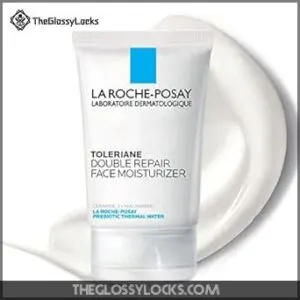
When your skin barrier needs serious support, La Roche-Posay’s Double Repair Face Moisturizer delivers clinical-grade results.
This dermatologist-recommended formula combines ceramide-3 and niacinamide to strengthen your skin’s protective barrier while reducing redness and irritation.
The lightweight texture absorbs quickly without leaving greasy residue, making it perfect for daily use on sensitive, rosacea-prone skin.
With 48-hour hydration and barrier repair within one hour, it’s fragrance-free and non-comedogenic.
Users consistently report calmer, more balanced skin with regular use of this French pharmacy staple.
Best For: People with sensitive, rosacea-prone, or dry skin who need effective barrier repair and long-lasting hydration without irritation.
- May cause slight pilling if rubbed too vigorously during application
- Recent formula changes with added squalane and corn starch may affect tolerance for some users
- Not available in all regions, requiring international purchasing in some areas
- Provides 48-hour hydration with barrier repair in just 1 hour using ceramide-3 and niacinamide
- Fragrance-free, non-comedogenic formula that’s gentle on sensitive and rosacea-prone skin
- Lightweight texture absorbs quickly without greasiness, suitable for layering under makeup and sunscreen
2. EltaMD UV Clear Face Sunscreen
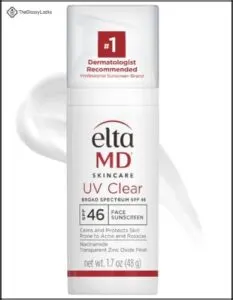
Protection is your first line of defense against rosacea flare-ups, and EltaMD UV Clear Face Sunscreen delivers exactly that.
This dermatologist-recommended formula combines 9% zinc oxide with SPF 46 broad-spectrum protection to shield your sensitive skin from harmful UV rays.
You’ll love its lightweight, oil-free texture that won’t clog pores or leave a white cast on your complexion.
The formula includes 5% niacinamide to calm redness and hyaluronic acid for added hydration.
Here’s why it’s a good choice:
- Its key ingredient, zinc oxide, blocks those pesky UVA and UVB rays that can trigger flare-ups.
- This sunscreen also contains niacinamide, hyaluronic acid, and an antioxidant to promote healthy-looking skin and reduce redness.
Best For: People with rosacea, sensitive skin, or acne-prone complexions who need daily sun protection that won’t trigger flare-ups or irritation.
- Contains 5% niacinamide and zinc oxide to calm redness while providing SPF 46 broad-spectrum protection
- Lightweight, oil-free formula that doesn’t leave white cast and works well under makeup
- Dermatologist-recommended with fragrance-free, non-comedogenic formulation suitable for sensitive skin
- Higher price point compared to drugstore sunscreen alternatives
- Some users with niacinamide sensitivities may experience irritation despite gentle formula
- Not water-resistant, requiring reapplication after swimming or heavy sweating
3. Aveeno Redness Relief Cleanser
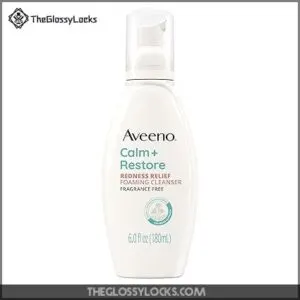
When your skin feels like it’s always angry, Aveeno’s Calm + Restore Redness Relief Foaming Facial Cleanser steps in as your gentle peacekeeper.
Your gentle ally in the battle against angry, reactive skin.
This dermatologist-recommended cleanser features calming feverfew extract—a natural antioxidant that’s ten times more potent than vitamin C at reducing redness.
You’ll appreciate its hypoallergenic, non-comedogenic formula that’s free from fragrances, oils, parabens, and other irritants.
The foaming texture effectively removes dirt, oil, and makeup without over-drying your sensitive skin.
Clinical studies show it provides immediate soothing relief, though results vary among users.
Perfect for daily use in your morning and evening routines.
Best For: People with sensitive, redness-prone, or rosacea-affected skin who need a gentle daily cleanser that won’t irritate while effectively removing makeup and impurities.
- Contains feverfew extract, a natural antioxidant 10x more potent than vitamin C for reducing redness
- Hypoallergenic, fragrance-free formula safe for sensitive skin and won’t clog pores
- Provides immediate soothing relief while effectively removing dirt, oil, and makeup
- Results vary among users, with some experiencing only slight improvement in redness
- May cause dryness for people with very dry skin types
- More expensive than basic cleansers without specialized redness-fighting ingredients
4. Azelaic Acid Serum For Redness
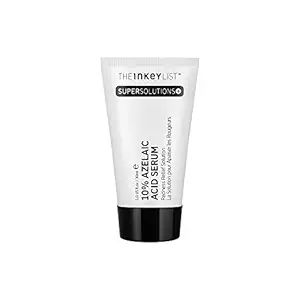
When dealing with stubborn rosacea redness, azelaic acid serum stands out as a dermatologist favorite. This powerhouse ingredient tackles inflammation while being gentle enough for sensitive skin. Azelaic Acid Serum delivers results with 10% azelaic acid and 0.3% allantoin working together to calm irritation and reduce visible redness.
Here’s what makes it so special:
- It calms and evens your complexion.
- No white cast, no fuss.
- Layers seamlessly under your favorite products.
Clinical studies show 70-80% of users experience noticeable improvement within 8 weeks. The lightweight formula absorbs quickly without pilling, making it perfect for daily use. Start applying every other morning to build tolerance, then work up to twice daily for ideal results.
Understanding rosacea redness causes is vital for effective management and treatment of the condition.
Best For: People with rosacea, sensitive skin, or persistent redness who need a gentle yet effective treatment that won’t irritate their skin.
- Clinically proven to reduce redness in 70-80% of users within 8 weeks with gentle 10% azelaic acid formula
- Lightweight, non-comedogenic texture that layers well under other products without leaving white cast or pilling
- Contains soothing allantoin (0.3%) and niacinamide for additional anti-inflammatory benefits
- May cause mild burning or stinging during initial use, especially for very sensitive skin
- Some users report slight pilling when layered with certain sunscreens
- 30-gram bottle size may not provide enough product for the price point for long-term use
5. Differin Acne Treatment Gel
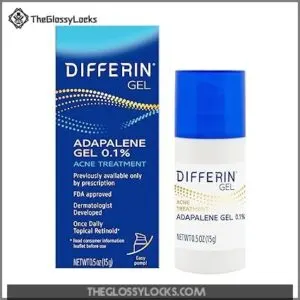
Combining rosacea and acne treatments requires careful consideration.
Differin Acne Treatment Gel contains 0.1% adapalene, a prescription-strength retinoid that normalizes skin cell turnover while targeting inflammation.
This dual action helps clear breakouts and reduce papules common in rosacea. The gel’s fragrance-free, non-comedogenic formula suits sensitive skin types.
Clinical studies show significant reductions in inflammatory lesions after 8-12 weeks of consistent use.
Start with small amounts applied once daily to clean skin, and always use sunscreen since adapalene increases photosensitivity.
Expect initial irritation that typically subsides with continued use.
Best For: People with combined acne and rosacea who need a gentle, prescription-strength retinoid that targets both inflammatory breakouts and papules without excessive irritation.
- Initial purging phase may worsen symptoms for 3-4 months, especially during the first month of use
- Increases photosensitivity requiring daily sunscreen use and may cause dryness, redness, and peeling
- Limited effectiveness on rosacea erythema and visible blood vessels, primarily targeting papules and pustules only
- Contains 0.1% adapalene, the first OTC prescription-strength retinoid that normalizes skin cell turnover and reduces inflammation
- Fragrance-free, non-comedogenic formula specifically designed for sensitive skin types prone to rosacea
- Clinical studies show significant reduction in inflammatory lesions after 8-12 weeks of consistent use
6. La Roche-Posay Toleriane Gentle Cleanser
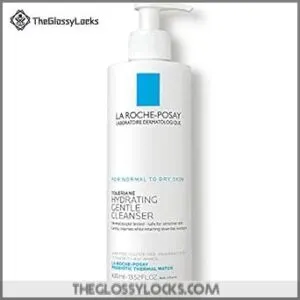
Choosing the right cleanser becomes essential when you’re managing rosacea-prone skin.
La Roche-Posay Toleriane Gentle Cleanser delivers exactly what sensitive skin needs: thorough cleansing without the drama.
This soap-free, fragrance-free formula contains niacinamide to reduce redness and ceramide-3 to strengthen your skin’s protective barrier.
The creamy texture won’t strip your skin’s natural oils or disrupt its pH balance, making it perfect for twice-daily use.
With prebiotic thermal spring water providing additional soothing benefits, this cleanser helps calm inflammation while keeping your skin comfortable and hydrated throughout the day.
Best For: People with sensitive, rosacea-prone, or dry skin who need a gentle daily cleanser that won’t cause irritation or strip natural oils.
- Contains niacinamide and ceramide-3 to reduce redness and strengthen the skin barrier
- Soap-free, fragrance-free, and non-comedogenic formula minimizes irritation risk
- Creamy texture cleanses thoroughly while maintaining skin’s natural moisture and pH balance
- Higher price point compared to typical drugstore cleansers
- May not effectively remove heavy or waterproof makeup without additional products
- Some users with extremely sensitive skin may still experience occasional irritation
7. Eucerin Redness Relief Night Creme
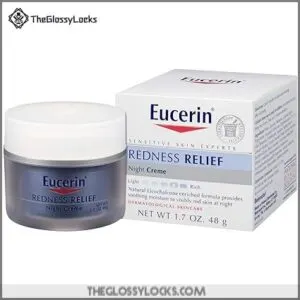
While you sleep, Eucerin’s Redness Relief Night Creme targets irritated skin with Licochalcone, a soothing licorice root extract.
This fragrance-free formula hydrates deeply while calming inflammation overnight. You’ll need only a small amount for your face and neck, making the jar last about eight weeks.
Though some users notice initial mild irritation, most find it gentle enough for sensitive areas like eyelids. The cream works best with consistent nightly use, though you might need a week or more to see visible improvements.
It’s particularly effective for pressure-induced redness and environmental irritation, though severe rosacea may require stronger treatments.
Best For: Those with sensitive, redness-prone skin who need overnight relief from irritation and inflammation without heavy fragrances or harsh ingredients.
- Has been discontinued as of late 2024, making it difficult to find and potentially expensive from remaining retailers
- Some users experience initial mild irritation or find recent batches greasier than previous formulations
- May not provide sufficient moisture for very dry skin types or be effective enough for severe rosacea cases
- Contains Licochalcone (licorice root extract) that effectively reduces redness and calms inflammation while you sleep
- Fragrance-free, non-comedogenic formula that’s gentle enough for sensitive areas including eyelids
- Long-lasting value with only a small amount needed per application, making one jar last approximately 8 weeks
8. CeraVe PM Facial Moisturizer
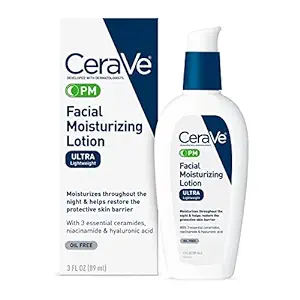
CeraVe PM Facial Moisturizer consistently delivers gentle hydration for rosacea-prone skin without causing irritation.
This dermatologist-developed formula contains three essential ceramides that rebuild your skin’s protective barrier, while hyaluronic acid locks in moisture for 24 hours.
The star ingredient, niacinamide, actively calms redness and soothes inflamed skin that’s common with rosacea flare-ups.
Despite its "PM" label, you can safely use this lightweight, non-comedogenic moisturizer morning or night.
The fragrance-free, oil-free formula absorbs quickly without leaving residue, making it perfect for sensitive skin that reacts to heavy products.
Best For: People with rosacea-prone or sensitive skin who need gentle, fragrance-free hydration that won’t trigger irritation or flare-ups.
- Some users with very sensitive skin may still experience mild redness or irritation
- "PM" labeling may confuse users, though it’s safe for morning use
- Pump bottle design may not dispense product efficiently when nearly empty
- Contains niacinamide and ceramides that actively calm redness and restore skin barrier function
- Lightweight, non-comedogenic formula absorbs quickly without leaving greasy residue
- Fragrance-free and oil-free formulation minimizes risk of irritation for sensitive skin types
Creating a Rosacea-Friendly Skincare Routine
Building a consistent skincare routine helps manage rosacea symptoms and prevents flare-ups when you choose the right products.
You’ll need to focus on gentle cleansing, proper moisturizing, and daily sun protection to keep your sensitive skin calm and protected.
Morning and Nighttime Skincare Routines
In your daily maintenance routine, skincare timing matters more than you might think.
Your rosacea skincare routine should focus on gentle, consistent care that works with your skin’s natural rhythms.
Here’s your simplified approach to routine simplification:
- Morning: Start with a fragrance-free cleanser, followed by a lightweight moisturizer and broad-spectrum SPF 30+ sunscreen
- Evening: Remove makeup gently, cleanse with your trusted gentle skincare products, then apply a soothing nighttime moisturizer
- Product layering: Apply thinnest to thickest consistency – serums before moisturizers, always ending with sun protection during the day
- Skin typing consideration: Your sensitive skin care needs consistency over complexity, so stick to proven products that don’t trigger flare-ups
Choosing The Right Cleanser for Rosacea
Why should gentle cleansing be your rosacea game-changer? The right cleanser protects your skin barrier while removing irritants that worsen facial redness.
Choose fragrance-free, non-comedogenic gentle cleansers with ceramides or hyaluronic acid. Avoid harsh detergents and rosacea triggers like sulfates.
Your sensitive skin deserves products that calm inflammation, not create it. Effective rosacea treatment often involves using products from a rosacea skin care routine.
Using Sunscreen and Moisturizer for Rosacea
Your skin barrier needs protection from UV rays and daily hydration to prevent rosacea flare-ups.
Mineral sunscreen with zinc oxide or titanium dioxide offers gentle formulas that won’t trigger sensitive skin. Using the right Rosacea Sunscreen products is vital for managing the condition.
- Choose broad-spectrum SPF 30+ mineral sunscreen for effective rosacea treatment
- Apply fragrance-free moisturizer with ceramides for enhanced skin hydration
- Layer products properly – moisturizer first, then sunscreen for maximum skin barrier protection
- Reapply sunscreen every two hours to maintain consistent defense against rosacea triggers
Natural Ingredients for Rosacea Skincare
Natural ingredients offer gentle yet effective solutions for managing rosacea-prone skin without harsh chemicals that can trigger flare-ups.
These plant-based options provide anti-inflammatory and soothing benefits that work well with your skin’s natural healing processes, offering a solution that is both gentle and effective with soothing benefits.
Rosehip Oil for Anti-Inflammatory Benefits
When you’re dealing with rosacea, rosehip oil offers powerful anti-inflammatory benefits that can transform your skincare routine.
This natural remedy contains high levels of omega-3 and omega-6 fatty acids that work to repair damaged skin and reduce inflammation effectively.
The oil’s numerous rosehip oil benefits make it an ideal ingredient for sensitive skin care products.
Here’s how rosehip oil supports your sensitive skin:
- Inflammation Reduction: The antiinflammatory properties calm redness and irritation during flare-ups, providing skin soothing relief.
- Skin Regeneration: Vitamin A boosts skin resilience and helps retain moisture, supporting your skin’s natural barrier function.
- Anti Aging Protection: Antioxidants protect against environmental stressors that can worsen rosacea symptoms while promoting skin calming effects.
Chamomile for Soothing and Calming Rosacea
Chamomile’s anti-inflammatory compounds, including terpenoids and flavonoids, provide exceptional Rosacea Relief for sensitive skin.
These Herbal Remedies reduce redness and irritation while Skin Calming properties soothe flare-ups.
Chamomile Benefits include gentle hydration and barrier support through topical creams or compresses.
Clinical studies show chamomile extract matches prescription treatments for antiinflammatory skincare.
This Soothing Oils ingredient calms reactive skin naturally.
Using natural remedies can help alleviate rosacea symptoms and promote overall skin health.
Green Tea for Antioxidant and Anti-Inflammatory Properties
While chamomile soothes skin naturally, green tea extract offers powerful antioxidant properties that make it another excellent herbal remedy for rosacea management.
Green tea extract delivers powerful antioxidant protection that naturally calms rosacea’s inflammatory response.
This antiinflammatory powerhouse contains polyphenols, especially EGCG, which actively reduce inflammation and calm redness in sensitive skin.
Green tea’s benefits extend beyond basic soothing:
- Protects against environmental damage – Antioxidants shield your skin from UV rays and pollution that trigger flare-ups
- Reduces inflammation frequency – Regular use can make rosacea episodes less severe and less frequent
- Calms existing irritation – Tea extracts provide immediate relief during active flare-ups
The EGCG compound in green tea extract works by promoting cellular repair while fighting oxidative stress that worsens rosacea symptoms.
Frequently Asked Questions (FAQs)
What products are good for rosacea?
Looking for gentle relief from facial sensitivity?
You’ll want products with niacinamide, hyaluronic acid, and ceramides like La Roche-Posay Toleriane moisturizer, CeraVe cleansers, and mineral sunscreens with zinc oxide for daily protection.
What iS the number one trigger for rosacea?
Sun exposure stands as the most common rosacea trigger, affecting nearly everyone with this condition.
You’ll want to wear broad-spectrum SPF 30+ sunscreen daily and seek shade during peak hours to prevent flare-ups.
iS CeraVe rosacea friendly?
Like a gentle harbor protecting ships from storms, CeraVe offers refuge for rosacea-prone skin.
Yes, CeraVe’s rosacea-friendly because it contains ceramides and hyaluronic acid that restore your skin barrier without irritation.
How often should I moisturize my face if I have rosacea?
You should moisturize your face twice daily with rosacea – once in the morning and once at night.
This helps maintain your skin barrier and prevents irritation that can trigger flare-ups.
What type of skincare is good for rosacea?
Think of your skin as a delicate flower needing gentle care. You’ll want fragrance-free cleansers, ceramide-rich moisturizers, mineral sunscreens, and soothing ingredients like niacinamide and hyaluronic acid to calm inflammation.
How to treat rosacea sensitive skin?
Use gentle, fragrance-free cleansers and moisturizers with ceramides and niacinamide.
Apply mineral sunscreen daily with zinc oxide or titanium dioxide.
Avoid harsh scrubs, alcohol-based products, and known triggers like spicy foods, and consider fragrance-free options to minimize irritation.
What not to put on rosacea skin?
Avoid harsh scrubs, alcohol-based toners, retinoids, fragrance, and spicy skincare ingredients. Don’t use acne treatments with salicylic acid or benzoyl peroxide. Skip hot water and aggressive exfoliants that’ll worsen irritation.
What is the best thing to wash your face with if you have rosacea?
Gentle, fragrance-free cleansers work best for rosacea-prone skin.
CeraVe Hydrating Facial Cleanser and Vanicream Gentle Facial Cleanser effectively remove makeup and oils without stripping your skin’s protective barrier or triggering flare-ups.
How often should I exfoliate sensitive skin with rosacea?
People with rosacea shouldn’t exfoliate at all or should limit it to once monthly with extremely gentle methods. Your skin’s already inflamed, so skipping exfoliation prevents further irritation and flare-ups.
Will rosacea skincare products help with acne and redness?
Rosacea products can be like a double-edged sword for acne-prone skin. While they’ll calm redness beautifully, they mightn’t tackle acne effectively since they’re formulated for sensitivity, not breakouts.
Conclusion
Think of your rosacea journey like tending a delicate garden—you’ve learned which sensitive skin care products for rosacea nurture your skin rather than irritate it.
You now understand that consistency beats complexity, and gentle formulations work better than harsh treatments.
By choosing products with proven anti-inflammatory ingredients and avoiding common triggers, you’re building a sustainable routine that supports your skin’s natural healing process.
Remember, managing rosacea isn’t about perfection—it’s about finding what works for your unique skin, and gentle formulations can make a significant difference.

